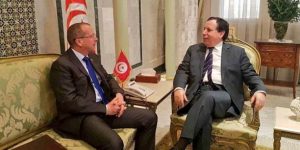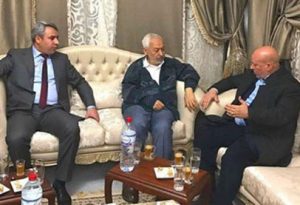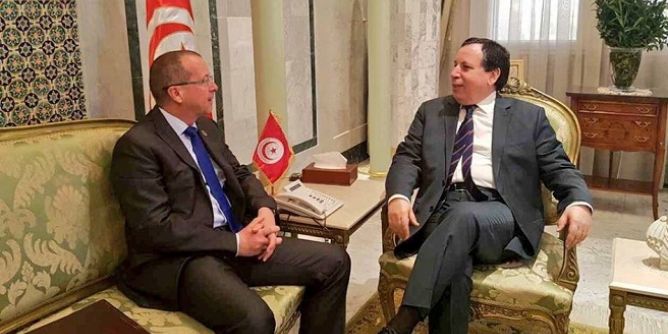By Libya Herald reporter.

Tunis, 13 February 2017:
Tunisia’s efforts to help solve the crisis in Libya came in for praise from UN Special Envoy to Libya Martin Kobler when he met the Tunisian Foreign Minister Khemaies Jhinaoui today.
For his part, Jhinaoui underlined the importance of the UN and the international community in supporting political reconciliation in Libya.
The foreign minister told Kobler that allowing Libya to remain divided by factional fighting would only allow terrorism and organised crime to prosper. He also gave the UN envoy an overview of his country’s efforts to help find a political consensus in Libya.
Tunisia has been coordinating with Algeria, and more recently with Egypt, in attempts to bring about a solution to the Libyan crisis. At present all eyes are on Cairo where the Egyptian government is trying to bring about an deal between Presidency Council leader Faiez Serraj and Khalifa Hafter. However, according to Algerian newspaper Echorouk, plans are already in hand for an meeting of Algerian, Tunisian and Egyptian foreign ministers next month as part of the tripartite attempt to stabilise Libya. It is expected to take place in Tunis. No date has been announced as yet.
Tunisia’s Muslim Brotherhood party, Ennahda, which is part of the coalition governing the country, is also fully involved. Its role, though, is to convince the Libyan MB and other Islamists to moderate their views and accept a broad-based Libyan government which would include Hafterites.
The leader of Tunisia’s Muslim Brotherhood (MB), Rachid Ghannouchi, who a week ago publicly announced his support for Tunisian efforts to solve the Libyan crisis, has confirmed that he recently had a meeting in Tunis with the political mentor of the Libyan MB, Ali Salabi, and the head of the Algerian president’s office Ahmed Ouyahia. He is reported saying that Salabi was not convinced at first of the need for compromise.
Ghannouchi has also recently met the head of the MP’s political wing, the Justice and Construction Party, Mohamed Sawan, and the head of the party’s political office, Nizar Kawan. There are claims, too, that in Turkey last week he met Serraj, Abdulhakim Belhaj and a number of other MB officials. The reports, though, have not been confirmed.

Ghannouchi’s involvement has drawn criticism from a number of Libyan political activists and academics who accuse him of interfering in Libyan affairs and trying to promote an Islamist agenda. However, Algerian officials have been quoted in the Algerian media saying that efforts by Ghannouchi and Ahmed Ouyahia are fully part of the North African tripartite efforts to bring about peace in Libya and do not constitute a parallel undertaking by Ghannounchi and Algeria.
This notwithstanding, Algeria’s links to the Ennahda leader have prompted boycotting Presidency Council member Ali Gatrani to accuse it of supporting the Islamists.







